
There have been attempts to protest outside the court in Beijing
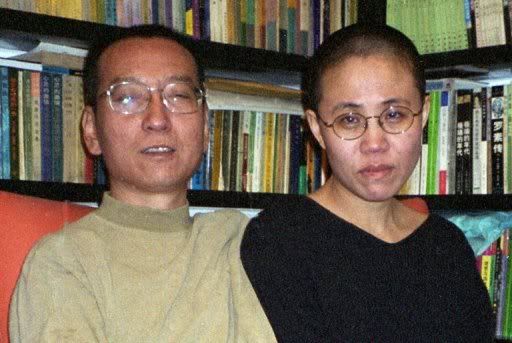
Chinese dissident Liu Xiaobo (L) and his wife Liu Xia in Beijing in 2002.
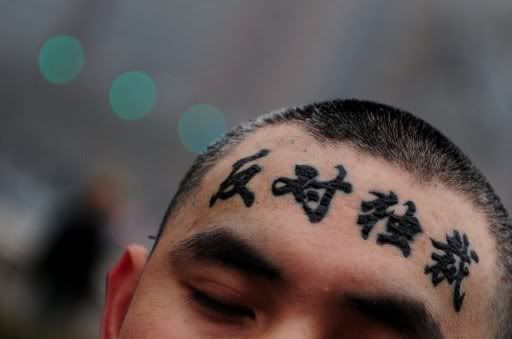
A lone protester displays his forehead after taking off a cap to reveal "oppose the dictators" in support of Liu Xiaobo
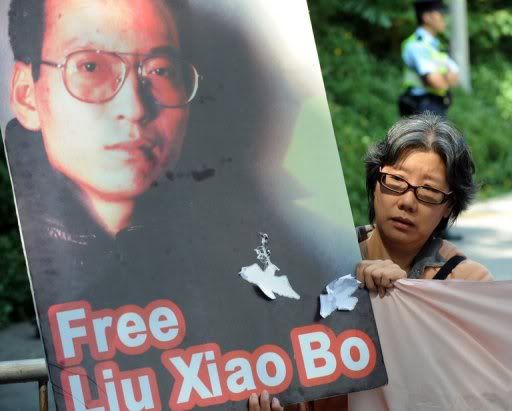
A protester holds a picture of Chinese writer Liu Xiaobo at a demonstration in Hong Kong in November
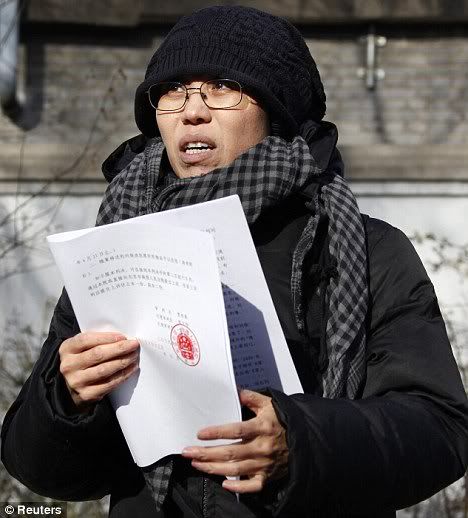
Xiaobo's wife Liu Xia reacts as she reads the court's official verdict outside the office of her husband's lawyer in Beijing today
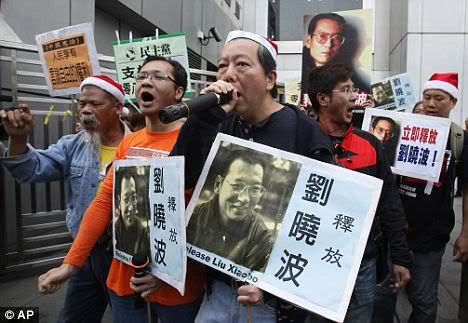
Protesters hold pictures of Liu Xiaobo during a protest in Hong Kong
China may be a giant, but it is one with pygmy tendencies.
Beijing’s sentencing of its most prominent dissident to 11 years for his writings calling for political reform highlights the combination of fear and swagger that characterises the ruling Communist Party.
At every turn, the party demonstrates an almost pathological terror of its own people. That it can be afraid of a 53-year-old literature professor who is virtually unknown among his 1.3 billion fellow Chinese is a show of weakness.
At the same time it is a demonstration of the party’s self-confidence. As the world’s third-largest economy and a growing force on the international stage, it feels able to ignore protests from the European Union to the United States.
The sentencing shows how China feels less and less in thrall to the outside world as it treads a path towards superpower status.
Jailing Liu Xiaobo is the latest in a series of actions that reflect a China emboldened.
It was China’s “No” in Copenhagen that finally defanged a draft treaty that was in any case almost toothless. It was the first time Beijing – which usually prefers a low-profile role – had so overtly forced its stance on the rest of the world. It has consistently rebuffed Western calls to revalue the renminbi.
That Beijing feels comfortable with a more assertive role was underscored again just this week when it unveiled draconian new internet regulations that will create a “whitelist” of approved websites. That could place most of the internet off-limits to Chinese.
The authorities no doubt position this as part of a crackdown on pornography. In effect, they feel under no obligation to allow their people free access to the Internet lest they run across items deemed subversive – the charge on which Liu Xiaobo was convicted.
Beijing has ignored international criticism of its crackdown on Tibetans who rose up in protest last year. The Internet, mobile phone messaging and international calls remain inaccessible for residents of mainly Muslim western Xinjiang after a bloody anti-Chinese riot in July. A Xinjiang blogger has been detained without charge by the security.
There is every likelihood that in a China increasingly unruffled by international criticism and ever more in fear of its own people, more dissidents will follow Mr Liu behind bars.
Leading Chinese dissident Liu Xiaobo will be tried Wednesday on subversion charges, his wife and lawyer said, more than a year after he was detained following his role in a bold pro-democracy petition.
"He will be tried on Wednesday," wife Liu Xia told AFP by phone on Monday.
"I have no hope whatsoever, I can't even attend the trial," she added.
The trial will take place at the Beijing Number One Intermediate People's Court, according to Liu Xia, who said she planned to wait outside the courthouse if she is denied entry.
"Under normal circumstances, the trial will be over in half a day," Liu's lawyer Shang Baojun said, putting the start time at 9:00 am (0100 GMT).
Shang explained that the defendant's wife could enter the courthouse only as a witness, and she had yet to be summoned.
Rights groups in China have said they fear that officials will rush the case through the courts during the Western holiday season in a bid to attract less global attention.
"We are seriously concerned that Liu will not get a fair and open trial, and his legal rights will not be respected," said Jiang Yingying, a researcher for China Human Rights Defenders, a network of activists.
Both the United States and European Union have urged China to free Liu and end the harassment and detention of political dissidents. Beijing says the calls are "unacceptable."
"We oppose any foreign forces using this as an excuse to interfere in China's internal affairs and judicial sovereignty," foreign ministry spokeswoman Jiang Yu told reporters last week.
The 53-year-old writer, who was jailed for his involvement in the 1989 Tiananmen pro-democracy protests, was arrested last December after co-authoring Charter 08, a widely circulated petition that called for political reform.
Shang said his client would face the charge of "inciting subversion of state power" -- related both to Charter 08 and to articles posted on the Internet after 2005.
The charge, which according to Shang carries a maximum jail term of 15 years, is routinely brought against those who voice opposition to the ruling Communist Party.
Rights groups accuse Beijing of abusing such charges to silence critics.
Charter 08, which was circulated online last year, calls for human rights protection and the reform of China's one-party communist system.
It has been signed by more than 10,000 people, including leading intellectuals, writers and dissidents, according to Chinese Human Rights Defenders.
Liu has spent much of the time since 1989 either in prison or under various forms of house arrest or tight monitoring. But he has still remained an irritant to Beijing with his writings calling for democratic pluralism.
Another prominent dissident, Ding Zilin -- the head of an activist group called the Tiananmen Mothers, who lost loved ones in the 1989 crackdown -- called for signers of Charter 08 to go to the court on the day of Liu's trial.
"Charter 08 was not drafted and initiated by Liu Xiaobo alone -- everyone joined in. So why arrest and try only him?" said Ding, a signatory herself, in comments made public by Human Rights in China.
"They will not allow us into the court to hear the trial, therefore we can join the trial outside the courtroom. This is what we can do. At least, we have to let Liu Xiaobo know that he is not alone."
-------
-------
RELATED POSTS:-
- Ohio executes inmate with untried injection method-Single injection.
- Hillary Clinton called to review alleged anti american sentiment in Amanda Know Italy murder trial.Presence of evidence negligent.
- Cold murder sentenced 26years in prison.Amanda Knox found guilty-4.4 euro million in compensation
- Robber shot dead part time money charger worker.Stole $10 000 pounds and laptop.Shot dead cold blood.
- Lethal injection for death row inmate may chance for less injection but slower death.
- World Leaders Blast Burma for Suu Kyi Sentence
- Climate talks deadlocked as clashes erupt outside
- Clashes at Greek demos to mark teen's police shooting-70 people arrested.Tear gas shot to control crowd.
- University of Calif. approves big fee hikes,$2,500 student fee increase -Student protests,pepper sprayed
- World Leaders gather for G20 summit - Protests mayhem in hundreds.
- Female gang robber bloodied on a street after being beaten, doused with petrol and set on fire during a lynching in Guatemala City.
- Itality PM attacked with a statue of city's gargoyled cathedral.Lost 2 teeth,broken nose and bloodied mouth.
- Tiger tamer mauled in front of live audience.Fighting for life now.
- Ohio serial killer suspect pleads insanity-Ohio suspect faces arraignment on 11 murder counts
- Muslim Population in the Military Raises Difficult Issues -Fort Hood suspect's religion was an issue, family says
- Fort Hood suspect said methodical goodbyes-Major Hasan give away possesions before gun rampage at Fort Hood kill 12 wounds 31
- Suspect, a devout Muslim, asked Army to discharge him, aunt said
- Army: Fort Hood shooting rampage suspect is alive-12 dead ,31 wounde worst gun rampage in USA military base.
- Executed in broad daylight: The chilling moment a Mafia hitman strikes outside a Naples bar... but no-one saw a thing
- Coroner says 6 women whose bodies were found at home died violently





0 comments:
Post a Comment